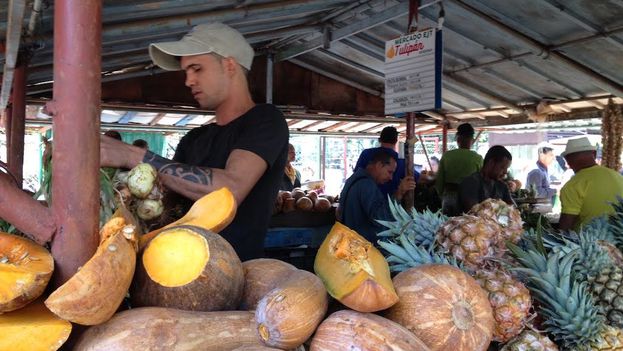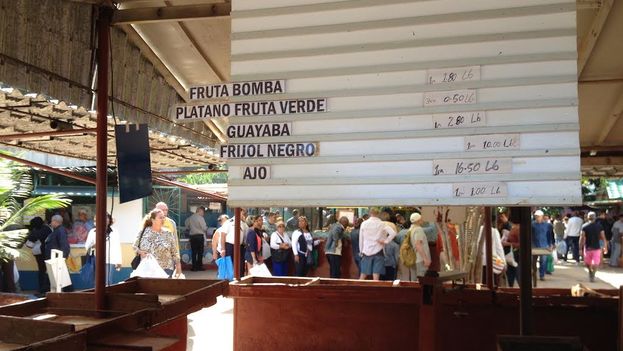
![]() 14ymedio, Zunilda Mata, Havana, 21 January 2016 – The imposition of price controls in some markets in Havana has provoked contradictory reactions in the population. Although it has been a relief to consumers’ pockets in the midst of the rising cost of living, the measure has been accompanied by an unwelcome raid on the cart vendors who sell agricultural products in the capital’s neighborhoods.
14ymedio, Zunilda Mata, Havana, 21 January 2016 – The imposition of price controls in some markets in Havana has provoked contradictory reactions in the population. Although it has been a relief to consumers’ pockets in the midst of the rising cost of living, the measure has been accompanied by an unwelcome raid on the cart vendors who sell agricultural products in the capital’s neighborhoods.
On Tuesday, the Youth Labor Army (EJT) market on Tulipan Street in the Nuevo Vedado neighborhood dawned with a singular hustle. After more than two weeks of empty stalls and worried consumers, a dozen products went on sale with controlled prices.
The measure was expected after an experiment that started earlier this month in Artemisa province, with the sale of agricultural products at “a maximum fixed value” by the Provincial Administrative Council.
In Havana, the controlled prices have not been extended to the majority of markets managed by the state farms and cooperatives. “This market has been one of the first to test the experiment,” said a vendor at the market administered by officials of the EJT.
The young man, whose stall was selling pineapples, yucca and other products, seemed apologetic at having to charge a customer 2.80 Cuban pesos (CUP) for a pound of guavas. The same quantity of product hadn’t dropped below 20 CUP at the end of last year. “This can’t last long, because eight guavas for six pesos can’t be maintained,” the employee complained.
A very different picture was developing in the central market of Egido, managed by private sellers and intermediaries. Since the beginning of the week a pound of red beans has held steady at 16 CUP and pork hasn’t fallen below 50 CUP for months. Despite the high prices, the quality of the merchandise attracted dozens of buyers on Tuesday.
“We’ll see how long they keep it up,” comments Gerardo, a truckdriver who brings goods from private farms in Alquizar to the well-known market. “Since the beginning of the year they’re making our lives hell on the highway,” he says, referring to the escalation of police controls on all the trucks carrying farm products and trying to enter the capital.
“Now we even have to show proof that we bought the fuel legally,” complains Gerardo, who says “with these decisions prices are going to shoot up.”
Next to him, a customer was shocked by taro at 15 CUP a pound, threatening to leave “for the EJT” but ending up buying it there. “A ride from Boyeros and Tulipan costs me 10 CUP. What I’ll save on one thing I’ll spend on another. Anyway, the quality isn’t the same, here it is always better because ‘the master’s eye fattens the horse’,” she concludes.
Television has accompanied the price controls with reports blaming intermediaries for the rise in prices. An appeal recently published by the National Union of Agricultural and Forestry Workers called for the total elimination of intermediaries saying that this would “contribute to a lowering of prices.”
Havana residents are in the midst of a silent price war between the State and private vendors which has almost completely eliminated from the urban landscape an element they has already become common: vendors with rolling carts. These improvised “kiosks with wheels” bring access to agricultural markets to distant places and offer their goods house-to-house.

Julia, who lives at Espada and San Lazaro Streets, says she is willing to pay “when I see a cart in the street.” With a bedriddem mother, she comments that she doesn’t have “the time or money to go a long way to buy food.”
Tato, one of the cart vendors who for years has sold near the park at Infanta and San Lazaro, was sitting on a wall this Tuesday with his legendary cart. “The inspectors they send take everything, the police won’t let us live anymore,” he says. He says the suppliers have had their goods confiscated on the roads entering the city.
The old man is convinced that what is happening now has been ordered by Raul Castro. “But let’s see how long the joke of controlled prices lasts,” he says.
Meanwhile, a young employee at the EJT market cajoled a girl looking undecidedly at pineapples. “Buy them now, my girl, you don’t know when they’ll run out. It’s the right gift for Epiphany, just a little late.”
